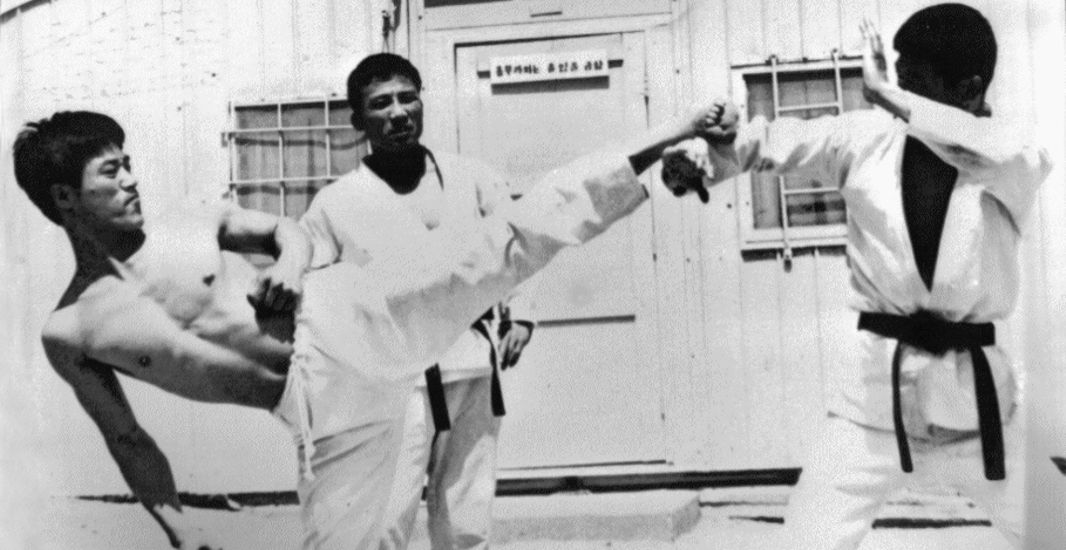The Kong family is a clan of extraordinary black belts. In addition to laying a foundation of excellence in the art of Tae Kwon Do, they have extended their martial arts skills to include music, golf, and American football.
Starting with the youngest, 13-year old Kimberly Kong, daughter of Young Bo Kong, she is truly a chip off the martial arts block. Trained in a very strict and traditional manner this young lady is herself a black belt champion. However, her real claim to fame is the way she is using her martial arts training outside of the dojang.
Kimberly is a budding classical concert pianist. Her flawless execution at the keyboard has put her in the winner’s circle at some of the nations most prestigious music competitions. At the ripe old age of 10 Kimberly was the youngest winner of the Duquesne Young Artist Competition, she also won grand prize in a world competition in 1998 and is currently practicing for another world title competition. Before Kimberly turned 11 she had performed as guest solo artist with Westmoreland Symphonic Orchestra and the Pittsburgh Symphony earning her the moniker of a piano prodigy. Even famed pianist Marvin Hamlish was drawn to the youngster’s powerful performance, so much in fact that Hamlish asked Kimberly to perform with him in concert, on two separate occasions.
“I started playing piano and studying Tae Kwon Do when I was 5,” said Kimberly. “My father thought Tae Kwon Do would be good discipline for me and I could apply that discipline to my piano practice and my school work.”
Kimberly had a burning desire to master the piano and needed no prompting from her parents to practice. In fact often they must intervene and make her take breaks or she would sit in front of the ivories all night long. This budding young superstar of the concert hall credits her martial arts training for her musical work ethic.
“I could play the piano all day if my parents would let me,” Kimberly said without taking her eyes off the black and white keys in front of her. “Tae Kwon Do has given me the discipline to sit still and practice for hours at a time. It’s also very important to be able to focus on the music, and that is also something I developed through my martial arts training.”
While Kimberly’s father continues to work with his daughter perfecting her kicks and punches, Kimberly’s mom, Mi, is constantly by her side at the piano. Mi was herself a former Miss Korea and a very talented singer-musician. She helps guide her daughter through the endless sheets of music, which Kimberly memorizes for each concert.
“My daughter has an amazing memory,” said proud father Young Bo. “When she competes Kimberly plays from memory. She has no sheet music in front of her and her performance often lasts between 30 and 40 minutes. However it is the emotion with which she plays that sets her apart from the others. Many famous orchestra conductors have said that Kimberly is able to bring the notes to life. One big reason for that is because her fingers are so strong from Tae Kwon Do training. And when she strikes the keys that strength is translated into her music.”
Kimberly’s father, Young Bo Kong is a no nonsense traditional teacher of Tae Kwon Do. Trained in Korea, Young Bo moved to the United States in the 70’s where he immediately demonstrated his skills by winning Grand Champion at the 1973 Pam American Games, then in 1974 he was the North American Champion, and in 1976 Middle Weight World Champion.
Many have called Young Bo the fastest kicker in the world. Although his flying feet have never been officially clocked, at age 47 they are still a blur to the naked eye.
“People have told me that I am the fastest kicker they have ever seen, but I don’t know about that,” Young Bo said modestly. “I train very hard and what I do is the result of that training.”
During his formative years it was common place for Young Bo to execute 4,000 kicks a day in a single workout. For this Korean black belt a 6-hour training day was not unusual or thought to be extreme. It was however his focus on excellence that pushed Young Bo to be the very best in his field. This is a trait that’s deeply embedded in the entire Kong family.
In addition to his speed, the Korean Tae Kwon Do master’s power is awesome. The combination of speed and power Young Bo generates is evident in his breaking demonstrations. Being able to break through solid objects tells the kicker that his or her form is effective in a combat situation. However, some students confuse power with force, and according to the 8th Degree master the results of such kicks are ineffective.
“One thing I see many people do is to push the bag when they kick it,” said Young Bo. “A push does not have any power. It may cause the bag to swing high but that is all for show. Such a kick would not severely injure an attacker. You must have snapping power, using your hip to generate the kind of force that will penetrate your target, not just push it. To perfect that kind of a kick requires much practice.”
The benefits of Tae Kwon Do are not limited to the dojang, in fact, the same training that Kimberly used to help perfect her skills as a concert pianist were also used by some of the NFL’s best known football stars to improve their game.
Superstars like Pittsburgh Steelers Greg Lloyd, who was called by his peers the toughest man in the game, and Ravens star cornerback Rod Woodson are but two of many top name athletics who train under Young Bo at his Dojang in Pittsburgh. They too have learned how to use Tae Kwon Do to improve their skills on a professional level.
“Tae Kwon Do and Master Kong was directly responsible for helping to extend my career in the NFL,” said black belt Greg Lloyd. “My focus improved, and the stretching I learned greatly reduced my chance of getting injured during a game.”
“The stretching was a big help to me during game day,” said Woodson. “Tae Kwon Do also helped enhance my hand eye coordination and ability to focus. All of these things are very important for a football player.”
The youngest Kong brother is Master Young Joon Kong. He too was a national and world-class martial arts champion who eventually translated his Tae Kwon Do skills to another sport.
In 1983 he was the A.A.U. National Welterweight Champion, in 84 Young Joon fought his way to become the United States National Champion. The ultimate honor for the youngest Kong brother came in 1988 when he was elected Team Captain for the U. S. Olympic Team.
“I hate to admit it but my youngest brother is the strongest fighter in the family,” said Young Bo. “His legs are so strong that he can take two steps, jump over a man’s head and deliver a couple of kicks in the process.”
Young Bo went on to say that his baby brother also has a mean streak in him, which often left his opponents laying flat on their back.
“Young Joon has a mean streak in him whenever he fights,” said Young Bo. “I remember when he was fighting in the finals of the U.S. National, and his opponent threw a round house kick to my brothers chest. Joon jumped over his head, spun around in mid-air and landed a hooking kick to his head and knocked him out. Even with all of the protective gear they wore his opponent could not withstand my brothers power.”
Like the Kong’s entire brother Joon has a strong desire to win, but even if winning is not in the cards, quitting is never an option. This never-say-die- attitude was clearly demonstrated in the final match of the 88 World Championships.
“In the semi-final round my brother broke his ankle,” said Young Bo. “It was so painful that he was unable stand let alone fight. But he refused to quit. In stead of forfeiting Joon stood there and let his opponent beat him up. He thought it was better to do that than to just give up. The guy he was fighting just tore Joon apart and he lost the match but in doing so he demonstrated the true spirit of Tae Kwon Do and the spirit of our family.”
Shortly after breaking his ankle Young Joon decided to hang up his black belt and pick up some golf clubs. Although he had never played a hole before in his life, the Tae Kwon Do Champion decided he wanted to become a pro golfer and that was that. Joon approached the game with the same dedication that made him a martial arts champion.
“We could not believe he wanted to stop Tae Kwon Do to be a professional golfer,” recalled Young Bo. “He would spend 10 to 12 hours a day on the greens learning the game. Three years from the day he began golfing Joon returned to Asia and turned pro. He did not think he was good enough to compete in America so he went home to begin his new career. Two years later he was the leading player in Asia. In 1998 he won the Asian PGA tournament and every years since he has been in the top 10.”
Young Bo went on to say that skills his brother learned in Tae Kwon Do greatly helped him in his new profession.
“As a martial arts champion Joon was not intimidated by others so that was in his favor when he played against better known golfers. And Tae Kwon Do gives you good hand eye coordination and focus. That and good balance is all apart of martial arts training and all of those things my brother has used to become a winning professional golfer.”
Although Tae Kwon Do has been in the Kong family for many generations both Young Bo Young Joon agree that they owe all of their martial arts success to their big brother, 9th degree Grand Master Kong Young.
It was under his watchful eye that he guided his siblings down the path of Tae Kwon Do whether they wanted to go or not. Young Bo recounted many times he did not want to train, but his big brother insisted and both he and Joon followed suit.
The elder Kong began his training at the young age of 9. His first teacher was General Woo, a strict individual who taught traditional Tae Kwon Do the old fashioned way.
“Training was very strict,” recalled Grand Master Kong Young 11. “For more than a month I was only allowed to clean the walls and floors of the school. We had to prove that we had proper discipline to learn Tae Kwon Do before he would teach us.”
Eventually GM Kong was able to put down the scrub brush and began training in earnest. He stayed with General Woo until he entered college. At that time Kong became captain of the University’s Tae Kwon Do Team.
His fighting skills earned him the title of National Champion of Korea, an honor he held and defended from 1963 to 1966. During that time he also became the Tae Kwon-Do instructor for the famous Korean army ROK team.
Leaving his homeland for the United States in late 60’s, GM Kong was the first to introduce Tae Kwon Do to America.
“There was no Tae Kwon Do in the United States when I first came here,” said Grand Master Kong. “I was the first one to use the Tae Kwon Do sign. I never-ever used karate, only Tae Kwon Do sign.”
“Americans had no knowledge of our Korean martial art,” recalled GM Kong. “When I told people I was teaching Tae Kwon Do they thought it was some kind of Asian cooking class. So I had to do many demonstrations to introduce Tae Kwon Do to Americans.”
His demonstrations were a smashing success, which resulted with him and his brothers operating the largest martial arts organization in the United States. However when his master, General Choi Hong Hi, founder of Tae Kwon-Do requested that Kong put on a series of world-wide demonstrations to promote Tae Kwon Do, Kong did so, unfortunately Kong’s chain of schools suffered in his absence.
“I traveled from 1973 to 1975 touring more than 100 countries doing demonstrations and promoting Tae Kwon Do,” said GM Kong. “Unfortunately my schools did not do well without me there to oversee them and I eventually moved to Los Angeles where I now have a large school in (location.)
Over the years GM Kong has made numerous contributions to his traditional art, including the revision of Tae Kwon Do hand techniques.
“When I trained Tae Kwon Do in Korea we would always kick, and never used our hands very well,” said GM Kong. “However after spending some time in the United States I began to see how effective boxing techniques were. In Tae Kwon Do our hands were to stiff and we always chambered our fists on the hip… same in Karate. This was not effective. Why punch from your chest? I learned it was better to punch from the chest and to stay relaxed until moment of impact…same with the kick. So I began teaching a different way to punch. Relax the entire body then at the last moment put your whole force into the target.”
Striving for excellence is a family attribute that is genetically built into the Kong family. The foundation for that drive and subsequent success is all attributed to their Tae Kwon Do training.





